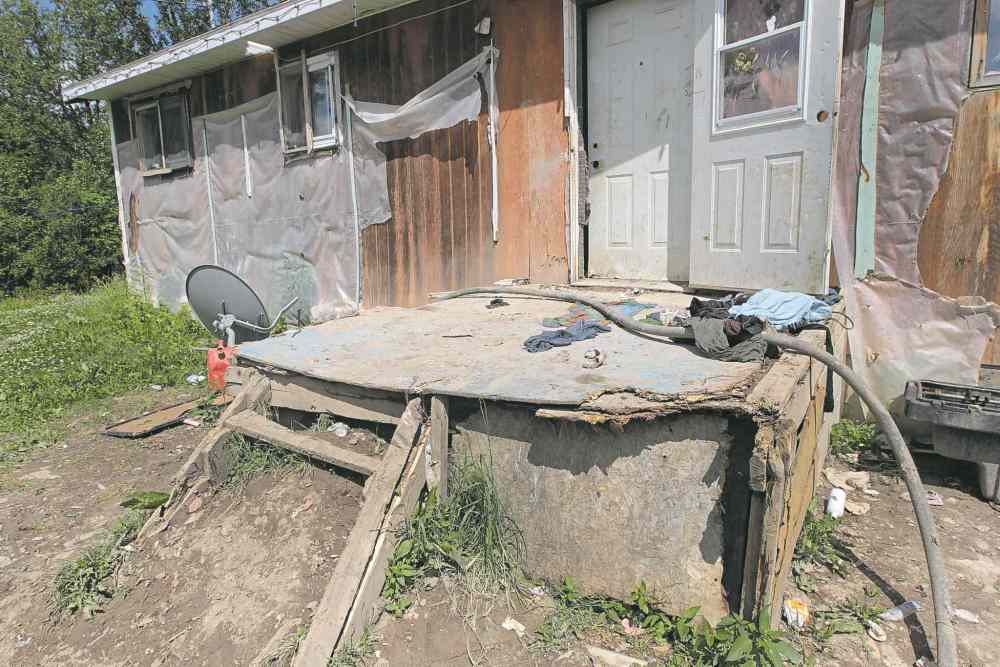$1.9-B housing crisis on reserves
Fraction of that budgeted for northern Manitoba
Advertisement
Read this article for free:
or
Already have an account? Log in here »
To continue reading, please subscribe:
Monthly Digital Subscription
$1 per week for 24 weeks*
- Enjoy unlimited reading on winnipegfreepress.com
- Read the E-Edition, our digital replica newspaper
- Access News Break, our award-winning app
- Play interactive puzzles
*Billed as $4.00 plus GST every four weeks. After 24 weeks, price increases to the regular rate of $19.95 plus GST every four weeks. Offer available to new and qualified returning subscribers only. Cancel any time.
Monthly Digital Subscription
$4.99/week*
- Enjoy unlimited reading on winnipegfreepress.com
- Read the E-Edition, our digital replica newspaper
- Access News Break, our award-winning app
- Play interactive puzzles
*Billed as $19.95 plus GST every four weeks. Cancel any time.
To continue reading, please subscribe:
Add Free Press access to your Brandon Sun subscription for only an additional
$1 for the first 4 weeks*
*Your next subscription payment will increase by $1.00 and you will be charged $16.99 plus GST for four weeks. After four weeks, your payment will increase to $23.99 plus GST every four weeks.
Read unlimited articles for free today:
or
Already have an account? Log in here »
Hey there, time traveller!
This article was published 02/02/2016 (3640 days ago), so information in it may no longer be current.
OTTAWA — Indigenous Affairs Minister Carolyn Bennett says the housing on northern Manitoba reserves is among the worst she’s seen, but she couldn’t say what kind of money her government is willing to spend to fix it.
Internal INAC documents obtained by The Canadian Press found it could cost $1.9 billion to fix the housing crisis on northern Manitoba reserves. Only $50 million is budgeted for reserve housing in Manitoba this year. That is to drop to $29 million next year.
While Bennett said her mandate letter from Prime Minister Justin Trudeau is clear that she must address the housing crisis, it’s unclear whether there will be an increase on housing spending in the upcoming budget.

“I think if every Canadian went to see the conditions in which these people are living, they would say we can’t afford not to do it,” Bennett told reporters Monday.
“We must address this issue. We actually have to recognize this is Third World conditions, and people are getting sick.”
Bennett said she has been to northern Manitoba reserves: “There’s no question in my mind that northern Manitoba is some of the worst I’ve seen.”
The documents obtained after an access-to-information request show the housing situation in Manitoba has worsened as infrastructure funding has been siphoned off to other areas.
“As a result, Manitoba First Nations continue to face further deterioration in infrastructure,” says the internal report dated January 2015. “Current estimates indicate a $1.9-billion need to address existing overcrowding, replacement and major repairs related to mould and substandard conditions of housing units.”
About 29 per cent of indigenous people in Manitoba live in poor housing. Alberta is the only other province where the number is that high. One-quarter of existing homes on reserves in both provinces need to be repaired or replaced.
Chief David McDougall said the situation is a “ticking time bomb” in his remote community of St. Theresa Point in the Island Lakes area. Fifteen-hundred people are waiting for housing on the cluster of four reserves in his tribal council. Last year, the reserve got 18 units.
It’s not uncommon for 18 people to live in a small bungalow, he said. Last year, there were 23 people living in a two-bedroom home.
“They had to take turns sleeping.”
Some reserves can build homes with a ministerial loan guarantee, but McDougall said that isn’t available if the reserve is under third-party management. The department’s report said only 30 per cent of Manitoba reserves operate independently.
The First Nations Regional Health Survey on Manitoba reserves from 2008 to 2010 found about 60 per cent of reserve homes had mould or mildew. That compares with 23 per cent on all reserves across Canada.
Ottawa has $150 million budgeted for on-reserve housing across the country this year. Over the last five years, the federal government has built about 1,750 new homes and renovated 3,100 others across the country.
The Assembly of First Nations estimates from 2013 to 2031, population growth and housing decay will mean reserves need 130,197 new housing units, 11,855 replacement units and major repairs to as many as 10,861 houses.

NDP critic Charlie Angus said Trudeau has made a number of big commitments to First Nations people, including $2.6 billion for education, an end to boil-water advisories within five years and a lifting of the funding cap that keeps any increase to First Nations programs to a maximum of two per cent a year.
Plus, there is the housing problem.
“How is any child going to get ahead in this country when there are 22 people living in a mould-infested shack?” Angus asked.
“So we need to hear what his infrastructure plan is.”
Angus said with such huge dollar figures, the government needs short- and long-term plans.
McDougall said St. Theresa Point residents are losing hope. Suicide rates are on the rise while others are addicted to a homemade alcoholic concoction called “superjuice.”
The federal government spent the last few years hooking up the reserve’s homes to water and sewer, but McDougall compared that to putting new tires on a rusty, decrepit car.
“We need to find a proper, sustainable solution.”
— The Canadian Press / Free Press
mia.rabson@freepress.mb.ca


